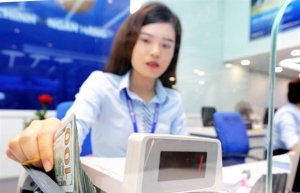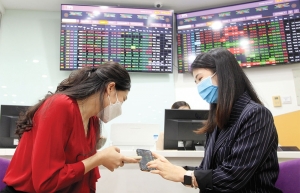Vietnam closer to emerging market status
Speaking at last week’s seminar on upgrading Vietnamese stock market and transparency of listed companies, Nguyen Son, chairman of Vietnam Securities Depository and Clearing Corporation highlighted that while the country has made strides in annual reporting practices and other standards, there remains a need for time and an appropriate roadmap to fully realise these ambitions.
 |
| Vietnam closer to emerging market status, illustration photo/ Source: freepik.com |
Out of the 12-13 assessment criteria considered essential for an upgrade from a frontier to an emerging market status, several are yet to be addressed. Should the upgrade materialise, Vietnam stands to draw an inflow of international capital estimated around $7.2 billion.
“The question is whether the Vietnamese securities market is truly prepared for an upgrade. If upgraded prematurely and unable to sustain its emerging market status, the subsequent downgrading could have even more significant repercussions than a methodical progression,” Son said.
From a capital perspective, he also pointed out that Vietnam currently approached its exchange rate with a one-way capital account liberalisation, unlike the bi-directional norm seen in many other countries. This means that while foreign capital inflows are standard, the withdrawal of such funds is not as straightforward as in other markets.
Instead, Vietnam relies on the foreign exchange status of its commercial banks to facilitate investors in purchasing foreign currency for repatriation. “This mechanism eliminates the risk of sudden, massive capital withdrawals experienced in countries like Thailand in the past,” Son added.
Another pressing issue on the path to an upgrade is the pre-funding of transactions. In the present state, foreign investors are required to transfer all funds to Vietnam before placing a securities purchase order. Market experts believe this poses inconvenience, and potentially risk to investors.
According to Son, the prevailing standard and practice is a Central Counterparty (CCP) clearing model for securities transactions. While the underlying market (shares and fund certificates) uses a multilateral netting model, derivatives markets settle through a CCP, and government and corporate bonds are settled instantly in full.
The envisioned payment system built on a new platform would do away with the need for pre-funding and introduce other risk management measures like forced buy-ins and sell-outs, and address any shortfall in cash or securities. However, this transition awaits the development and integration of newer technological platforms and certain regulatory constraints.
“If we do not implement the CCP model and continue with the current multilateral approach, can we delegate the responsibility of holding 100 per cent collateral in cash or securities to banks or securities firms on behalf of investors? I believe it’s feasible. But we need to assess the ethical risks of securities firms potentially misusing this, leading to market disruptions,” Son said.
According to Phan Quoc Huynh, deputy chairman of the Vietnam Securities Business Association and chairman of SBS Securities, the exchange between either foreign or domestic investors occurs directly with securities companies.
“Viewing from a transactional and economic perspective, if an investor or a securities company incurs a loss, they must shoulder their responsibilities individually.” Huynh said.
From a business entity’s viewpoint, Tran Minh Tuan, deputy chairman of Smart Invest Securities, mentions that the Law on Securities does not currently regulate pre-funding.
“However, several securities companies have offered it to investors, resulting in penalties from the SSC. Yet, it does not prohibit securities companies, but only penalises post-occurrence. This situation mirrors 2010 when the Law on Margins for collateral lending hadn’t been introduced, and securities firms lent under cooperative investment contracts, inherently associated with risks,” he added.
Dr. Can Van Luc, chief economist at BIDV, said that there is no need for collateral regulations, but risk prevention measures are crucial. Global surveys reveal that in cases without collateral, only about 2 per cent of investors default, resulting in approximately $3 billion in global losses annually. Based on this research, Luc suggested three risk prevention measures. “Firstly, Vietnam needs to decisively upgrade its transactional IT system. Secondly, stricter control over investor behaviours should be established, with penalties ranging $1,000-5,000. Thirdly, increasing the authority of securities companies in risk assessment is vital,” he said.
| The Ho Chi Minh City Stock Exchange (HSX) on October 10 engaged its market constituents to assess their readiness for the anticipated introduction of the Korea Exchange’s IT platform, the KRX system. As reported from testing held in September, a promising 59 of the 76 securities firms tested all functionalities with complete success, tallying a compliance of 77.63 per cent. Among them, Pinetree Securities stood out, having flawlessly tested across all functionalities. However, a subset of 17 securities companies has not fully validated all the system’s functionalities, amounting to a 23 per cent chunk of the participants. Further data shows 69 securities companies satisfying more than 80 per cent of the KRX system’s go-live functionalities. Conversely, a mere seven entities scored below this benchmark, including names like MB Securities, ACB Securities, NH Vietnam Securities, and particularly VIX Securities. While the testing phase witnessed an encouragingly high engagement level, HSX has expressed reservations about the market’s overarching preparedness for the KRX’s official inauguration. Current evaluations from the HSX indicate that only 10 of its members are unequivocally geared up for the system’s activation. In stark contrast, a substantial 66-member bloc, or 87 per cent, is categorised as being behind the readiness curve. |
 | Foreign investors remain optimistic about Vietnamese stock market From being net sellers in the first nine months of 2022, foreign investors have become the driving force supporting the Vietnamese stock market in the last few months, and the inflows are expected to continue this year. |
 | Securities firms urged to upgrade strategies Securities firms operating in Vietnam’s highly profitable brokerage services sector catering to international clients and institutional financiers must elevate their service standards to attract discerning clients, as intensified competition necessitates enhancing capabilities to meet the demands of foreign investors. |
What the stars mean:
★ Poor ★ ★ Promising ★★★ Good ★★★★ Very good ★★★★★ Exceptional
Related Contents
Latest News
More News
- Ministry of Finance tightens policy delivery at start of year (February 05, 2026 | 17:26)
- Vietnam steps up market reforms as FTSE Russell reviews upgrade progress (February 05, 2026 | 17:20)
- 2025 profits mixed amid strong energy and farming results (February 05, 2026 | 17:18)
- Cashless payments hit 28 times GDP in 2025 (February 04, 2026 | 18:09)
- SSIAM and DBJ launch Japan Vietnam Capital Fund (February 04, 2026 | 15:57)
- Banks target stronger profits, credit growth in 2026 (February 04, 2026 | 15:43)
- Vietnam on path to investment-grade rating (February 03, 2026 | 13:07)
- Consumer finance sector posts sharp profit growth (February 03, 2026 | 13:05)
- Insurance market building the next chapter of protection (February 02, 2026 | 11:16)
- NAB Innovation Centre underscores Vietnam’s appeal for tech investment (January 30, 2026 | 11:16)

 Tag:
Tag:


















 Mobile Version
Mobile Version